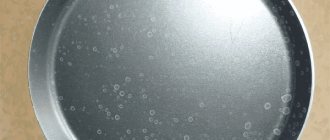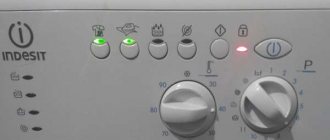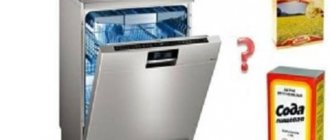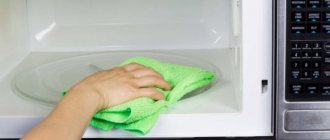Having a dishwasher not only relieves stress physically, but also saves the housewife time. Household appliances are now not uncommon; manufacturers offer expensive and economy-class units. But a high price offer does not guarantee that a specific odor will not arise during operation. There may be several reasons for such an unpleasant phenomenon. To get rid of the smell in the dishwasher, you need to determine the nature of its occurrence. Residues of food, stagnation of water, technical problems or incorrect installation not only cause a specific “aroma”, but also shorten the life of the device and deteriorate the quality of washed dishes.
Why does the dishwasher smell?
The dishwasher requires special attention and care. A prerequisite is compliance with the operating instructions. There can be several reasons why your dishwasher smells bad: stuck food waste, mold, unsuitable detergents, or stagnant water.
Leftover food
Food blockages are one of the common problems. Particles can settle in the filter, at the bottom of the dishwasher, or remain on the walls or surface of the door. You can observe the remains of unwashed food on the bottom bar of the machine, near the place where the door is attached. Also, if installed incorrectly, products settle on the drain pipe or the hose itself. If food waste remains in the unit, an unpleasant odor will certainly appear after a certain time.
Stagnation of water
Water may accumulate in a small amount in the pan of the machine. This is enough for the waste liquid to stagnate and a musty smell to appear. There may be several reasons for this phenomenon, but most often the drain hose was positioned incorrectly during installation. It is necessary to remove the liquid and run the dishwasher on the “Self-Cleaning” function. You can remove the water manually and wash the tray.
Failure to follow operating instructions
Not every kitchen utensil can be cleaned in the dishwasher. The instructions describe materials that cannot withstand high temperatures; plastic is prohibited. When heated, it begins to melt, causing a burning smell in the dishwasher. It is not recommended to place wooden cutting boards into the unit if they are glued together from several layers. When heated, the presence of glue will be felt, which will be problematic to get rid of.
Mold
Offensive odors in your dishwasher can be caused by mold. The fungus develops in hard-to-reach places: in water supply or drain hoses, near the heater, in the filter, in the door cuff. Visually determining where exactly the mold concentration is located is quite difficult.
Fungus can get into the car if the room is damp or the ventilation is poor
In this case, it is easier to prevent the appearance of odor than to fight it.
Advice! The dishwasher should be ventilated more often and should not be left with damp dishes in it with the door hermetically closed.
Unsuitable detergents
Special salt must be added to the kitchen unit to soften the water. The product also affects the quality of operation of household appliances and eliminates unpleasant odors. A liquid rinse (with or without fragrance) is also recommended.
If you use cheap detergent or do not follow the dosage, an unpleasant chemical smell may remain in the dishwasher, and a greasy film may remain on the walls.
Why does a new dishwasher smell while it's running?
When a new dishwasher is running, it may smell foul for several reasons:
- Household appliances are made of low-quality material, which when heated begins to emit an unpleasant odor. As a rule, the problem resolves itself after a few cycles.
- A more serious situation is accompanied by burning. The problem is that the contacts on the instrument panel of the car begin to melt. The cause may be voltage fluctuations in the network or manufacturer errors. In this case, you need to turn off the dishwasher and use the service.
- Burning wiring or a heating element is difficult to miss. The machine may still work for some time, the breakdown will appear later, but the smell will be present.
Important! At the first sign of burning, the equipment must be turned off and not used until the cause is identified and eliminated.
Why does my dishwasher smell like sewer?
A musty, sewer-like odor indicates a serious problem. It cannot be eliminated by cleaning the parts. If installation is carried out incorrectly, the unit will smell like sewage. The drain hose should be at an angle of approximately 40–100 cm above the floor, and not immediately mounted into the pipe. A siphon is required.
Correct installation of the drain hose will help eliminate sewer odor in the dishwasher.
Causes of stench
First you need to understand why dishes stink after being washed. Sometimes this is quite easy to do, and sometimes not so much. The very nature of the smell helps.
- If the dishes and machine smell either like rubber or burnt wiring, the reason is due to low-quality parts that are installed on the unit. With repeated contact with hot water, the material (usually plastic or rubber seals) breaks down and releases harmful and smelly substances that settle on the dishes and can even harm human health.
- If a strong chemical odor emanates from the bowels of the machine and from freshly washed dishes, then the detergent or rinse aid is to blame. Probably, the powder or tablets contain some kind of “vigorous chemistry”, which not only smells unpleasant, but can also be very harmful. By the way, tablets or dry powder do not always smell sharp. When in contact with hot water, their components can react, forming nuclear volatile substances.
- Not only a rubber or plastic smell can come from the machine, but also a completely ordinary garbage smell. In our opinion, this is the worst option when the washing chamber or dishes smell as if we happened to climb our head into a trash can. This happens because the user neglects to clean his home appliance and a fair amount of food debris has accumulated in it, which is not washed out naturally.
- Dishes or a dishwasher can smell unpleasant for a completely ordinary reason: if water has stagnated inside and mold has grown. The water inside can stagnate and die out due to poor ventilation of the washing chamber, especially if the user forgets to open the dishwasher door after finishing work.
How to eliminate the stench?
Eliminating the stench, knowing its cause, is not so difficult. Rubber or plastic aroma will either disappear on its own or never disappear. If you find that your dishwasher is emitting it, and even ruining the dishes, you should contact the seller. This is a good reason to return the machine and get your money back.
Chemical stench can be eliminated by changing the detergent and completely cleaning the dishwasher. Throw away your old laundry detergent, buy a cleaner and run the dishwasher empty with it, empty of dishes. After two or three washes, the stink will disappear. The stench of garbage can be eliminated by manual cleaning, as well as using a special dishwasher cleaner. After such procedures, both the machine and the dishes washed in it will smell pleasant.
Regular ventilation will help get rid of excess moisture inside. Make it a rule that as soon as the program ends, you take out clean dishes and put them in the cabinet, do not close the dishwasher door all the way, leave a gap, at least for a few hours. In most cases, this is enough to avoid problems with stagnant water and mold.
How to prevent it from happening in the future
Daily maintenance of your dishwasher will help prevent stench. Don’t forget to regularly clean the garbage filter, sanitize the machine, and wipe the inside of it with a dry and clean cloth. To ensure that water flows freely through the sprinkler nozzles, these nozzles must be cleaned at least once every six months.
In general, how to care for your dishwasher is described in detail in the instructions for it. If you do not neglect these recommendations, you will, firstly, “extend the life” of your assistant, and secondly, make its use pleasant and relaxed. Be attentive to the appliances in your kitchen, and they will definitely reciprocate.
In conclusion, we note that if even the dishes removed from the dishwasher smell unpleasant, then what can we say about the equipment itself. Most likely, it smells like a city dump, and along with it, the entire kitchen. We urgently need to take action, this cannot continue!
Share your opinion - leave a comment
How to get rid of odor in your dishwasher
Before removing odor from your dishwasher, you need to determine its source. If there is no specific opinion on where it is coming from, you will have to check all the problem areas in the dishwasher.
Filter check
Each household appliance comes with instructions that clearly describe the sequence of a particular job. Basically, in all models the filter is located in easy accessibility - at the bottom. To remove odor from your dishwasher:
- The filter is unscrewed and removed. It consists of parts: a plastic part in the form of a rack of threaded cells and an internal mesh base.
- The devices are disassembled and food remains are removed.
- Wash under running water. You can use any dishwashing detergent.
The mesh part is cleaned with a brush. To avoid damage, no force is needed.
The filter is assembled and installed in place, tightened until a characteristic click is heard.
Drain hose
If the unpleasant odor from the dishwasher persists after washing, and the source is not visually observed, it is recommended to clean the drain hose. They do this as follows:
- If water is found in the pan, it is removed.
- The dishwasher is turned on to the “Drain” function. This will remove any remaining liquid.
- The hose is unscrewed from the unit and disconnected from the drain point.
- Rinse well with hot water. To remove residual fat, you can use any alkali-based product.
- If the problem cannot be solved without additional equipment, use special brushes or wire wrapped in fabric.
After the procedure, the hose is returned to its place.
Checking the door gasket
Dishwashers may be equipped with rubber bands on the door. Food residue stuck in the seal may smell. To eliminate the smell from the dishwasher, you must first remove the grates, coat them with detergent and leave for a few minutes. Further actions:
- Using hot water and some cleaning agent, wash all the interior walls and door.
- Lifting the rubber gasket, wash with a sponge under it, then on top.
- If there is no rubber band, you can clean the joint with a toothbrush.
Replace the grilles and start the “Rinse” mode.
Pipes
It is recommended to check and clean the pipes from contamination at least once every 1.5-2 months. They do this as follows:
- It is necessary to stop the water supply to the dishwasher and close the tap.
- Disconnect the water supply hose from the tap and unit.
- Unscrew the filter and clean it well.
- Disconnect the pipes. Rinse well and rinse them with hot water and detergent.
- Under the pressure of water, also clean the hose itself.
Wipe the parts with a clean cloth, reinstall and screw the hose into the dishwasher, and resume the water supply.
Spray nozzles
Spray elements are located at the top and bottom of the dishwasher, attached to the bottom and top grid. They look like an oblong plank equipped with holes on which food debris or lime deposits accumulate. Bacteria begin to multiply and the machine smells unpleasant. To prevent this:
- The nozzles are removed and the surface is cleaned.
- Soak in water at a temperature of +50 0C.
- Leave for 20 minutes.
- Rinse under the tap. If necessary, remove food residues with a brush.
Helpful information
Tips for caring for your dishwasher to prevent unpleasant odors:
- after using any cleaning product, you need to ventilate the device - the longer it remains open, the better;
- Do not scrub the surface of the dishwasher with a hard metal brush;
- Do not violate the rules for operating the device specified in the instructions;
- to get rid of a slight odor, before the next wash you need to put 2-3 slices of lemon in the basket and run the standard program;
- If the dishes are loaded into the machine, but there is no time to run a full washing cycle, you need to turn on the rinse - this will wash away food residues and prevent them from rotting.
You will find a lot of useful and important information about removing various unpleasant odors from objects and surfaces in this section.
Chemical odor removers
To clean your dishwasher from odors, there is a wide range of household chemicals on sale: formulations without chlorine, with the addition of substances that gently remove limescale and grease residues, and disinfect the surface and parts of the machine. After treatment with such substances, the dishwasher does not smell.
The most popular inexpensive but effective means:
- "Calgonit Fusion Power" removes scale and fat deposits. This is a multifunctional tool. In addition to cleaning, it disinfects the surface and parts of the unit.
- Produced in Germany. The instructions indicate that with regular use of the product, the machine's performance will last longer. “UniPlus” removes grease deposits, cleans the surface of lime, and eliminates odors.
- Electrolux. The main advantage of the product is the elimination of fungus and bacteria.
All chemicals contain phosphates and alkali. Therefore, after cleaning household appliances, it is necessary to turn on the rinsing or self-cleaning mode.
Special preparations
There are many products on sale to rid your dishwasher of unpleasant odors. Top 3 best lineups:
Finish
Dishwasher cleaner is placed in the appliance along with the bottle and the cycle is started . The water temperature should not be less than 65 degrees. The product helps get rid of unpleasant odors, remove scale and fat deposits. The price of a 250 ml bottle is 300 rubles.
Somat Machine cleaner
The dishwasher cleaner is available in tablet form. You can load them into the machine along with the dishes. They eliminate unpleasant odors and help clean all hard-to-reach places in the device. Their use allows you to eliminate minor blockages, remove scale and fat deposits. The price for a package with 3 tablets is 600 rubles.
Paclan
A dishwasher cleaner is available in the form of a gel; its use can effectively get rid of unpleasant odors and grease deposits. In one cycle, the entire package will be used up; it will not be possible to divide it into several parts. The bottle with the cleaning product is placed in the machine without unscrewing the cap (it will dissolve on its own while the device is operating). The price of a 250 ml bottle is 200 rubles.
Traditional methods for cleaning dishwashers from unpleasant odors
You can remove odors from your dishwasher using traditional methods. I use them when I don’t have special household chemicals on hand or they cause an allergic reaction. To save money, homemade recipes are also suitable.
Table vinegar
Vinegar is taken at 6 or 9%. Stronger concentrations may damage plastic parts. Cleaning method:
- Pour 100 ml into a mug or glass.
- They put it on the grill. It’s better to go to the top so that the water pressure overturns the glass.
- You can run the appliance without dishes, when the water fills, pause, open the door and pour in vinegar.
After finishing work, there will be no residual grease, food odors or acid left in the dishwasher.
Baking soda
To prevent your dishwasher from smelling, you can use baking soda. Powder (about ½ pack) is poured onto the bottom and all surfaces are carefully cleaned with a sponge. Then the empty dishwasher is started in normal mode so that the water warms up to a temperature of at least +60 0C. When draining, the liquid with soda will clean the filter and hose parts.
Borax
An effective odor remover. You can buy it at the pharmacy. How to use:
- pour a little product onto the bottom;
- use a damp sponge to treat all accessible parts;
- add another 20 g of borax.
Start the machine in normal mode (without dishes).
Sodium tetraborate or borax is a white powder with a crystalline structure that resembles salt
A mixture of hydrogen peroxide and baking soda
To prepare the product, take a pack of soda and 10 ml of peroxide. Mix the components in a ceramic or plastic container, after the reaction put it in the refrigerator, you will get a dense substance in the form of a lump. Place it on the rack and turn on the dishwasher at maximum temperature. If desired, you can add a few drops of any essential oil as a flavoring.
Preventive measures
To prevent unpleasant odors from causing discomfort to the owner of the dishwasher in the future or not appearing at all, you should follow the basic rules for operating expensive equipment:
- Thoroughly clean dishes from food residues before placing them in the dishwasher drum.
- Clean doors, seals and grilles with a soft cloth, as well as ventilate the working chamber after each wash.
- Regular cleaning of the machine from residual grease and scale with special means for the purpose of prevention.
- Periodically wash the mesh filter, in which the smallest food debris can accumulate.
- Washing dishes immediately after loading them into the dishwasher. If you don’t have time for complete cleaning, it is recommended to at least rinse your kitchen utensils using aromatic agents.
Following these simple rules will help avoid the occurrence of unpleasant odors associated with the accumulation of liquid or impurities in the filter. A dishwasher is an expensive piece of equipment that will serve its owner faithfully if you carry out timely maintenance, clean it of grease and scale, and pay attention to strange odors immediately after they appear. This will help save not only time, but also money that will have to be paid for expensive equipment repairs.
Recommendations for care and use
In order not to encounter the problem of unpleasant odor in the dishwasher, you must follow a number of simple operating rules:
- Before loading, remove all food debris from the dishes.
- After completion of work, kitchen utensils are removed immediately. If this is not possible, open the door to allow the surface to dry.
- Use products recommended for dishwashers, good quality, that break down fats.
- You should not leave the unit loaded with dirty dishes for a long time, especially with the door closed.
- Do not allow water to stagnate in the pan.
- The self-cleaning function should be run periodically.
Important! After each procedure, clean the drain filter.
Prevention measures
In order not to waste time, effort and money on a difficult and often hopeless fight against odors, it is better to prevent their occurrence:
- Thoroughly clean the dishes from leftover food before placing them in baskets;
- periodically check the machine for the accumulation of food residues and bacteria, the formation of mold and scale, and the appearance of odors;
- run a dishwasher at high temperature at least once a month to remove deposits that still form inside the machine;
- do not keep dirty dishes in the chamber for a long time;
- do not leave washed dishes in the machine chamber for a long time;
- after each wash, leave the PMM open to dry, then wipe the door seal and hopper dry;
- periodically manually clean the dispenser trays from powder residues;
- regularly clean the drain and inlet filters, periodically rinse the drain hose;
- use high-quality detergents;
- Periodically clean the machine from scale using special means.
Fault marking meaning
It would seem that everything was done correctly: all the necessary ingredients were added (from salt and rinse aid to the appropriate detergent). The device will turn on and water will flow through its hoses. However, literally five minutes later a message appears about error code E1.
To get started, you can refer to the instructions. The transcript provides data on long-term activation or closure of the valve. The latter means that no water is supplied. This can happen for the following reasons:
- low water pressure at the inlet from the water supply system;
- it is necessary to check the sensors;
- If the above points are denied, the malfunction may be due to a broken electrical circuit inside the device.











